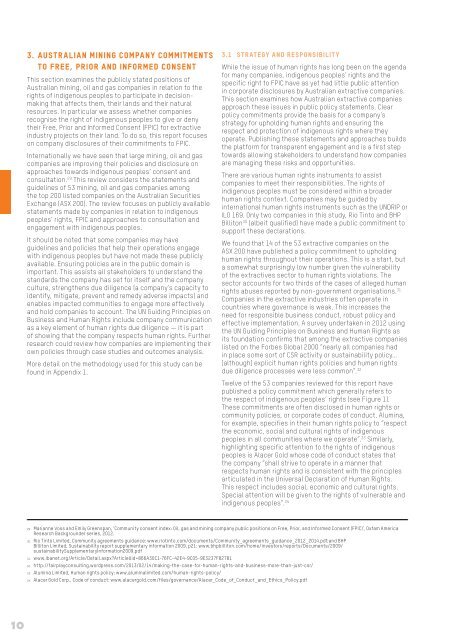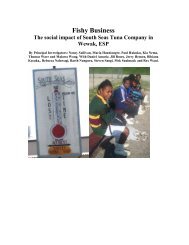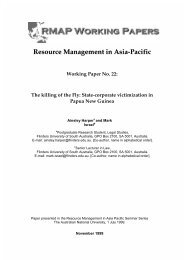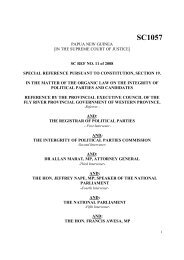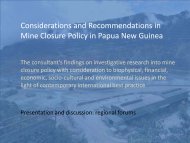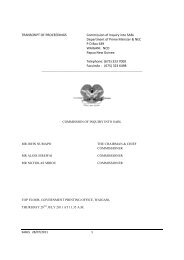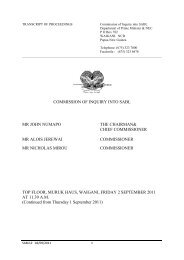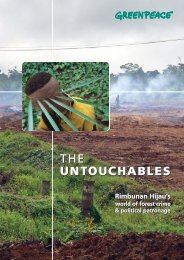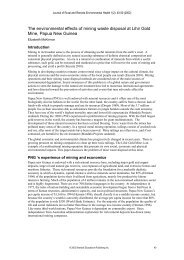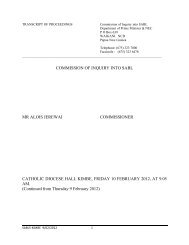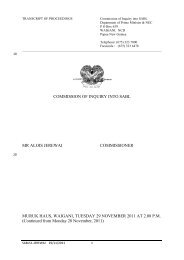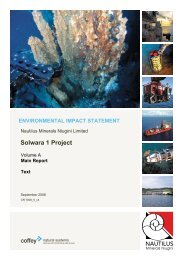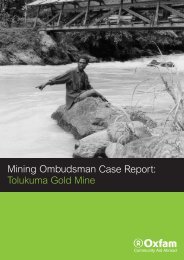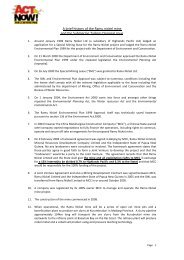Oxfam Australia and CAER: The right to decide
Oxfam Australia and CAER: The right to decide
Oxfam Australia and CAER: The right to decide
Create successful ePaper yourself
Turn your PDF publications into a flip-book with our unique Google optimized e-Paper software.
3. <strong>Australia</strong>n mining company commitments<br />
<strong>to</strong> Free, Prior <strong>and</strong> Informed Consent<br />
This section examines the publicly stated positions of<br />
<strong>Australia</strong>n mining, oil <strong>and</strong> gas companies in relation <strong>to</strong> the<br />
<strong>right</strong>s of indigenous peoples <strong>to</strong> participate in decisionmaking<br />
that affects them, their l<strong>and</strong>s <strong>and</strong> their natural<br />
resources. In particular we assess whether companies<br />
recognise the <strong>right</strong> of indigenous peoples <strong>to</strong> give or deny<br />
their Free, Prior <strong>and</strong> Informed Consent (FPIC) for extractive<br />
industry projects on their l<strong>and</strong>. To do so, this report focuses<br />
on company disclosures of their commitments <strong>to</strong> FPIC.<br />
Internationally we have seen that large mining, oil <strong>and</strong> gas<br />
companies are improving their policies <strong>and</strong> disclosure on<br />
approaches <strong>to</strong>wards indigenous peoples’ consent <strong>and</strong><br />
consultation. 29 This review considers the statements <strong>and</strong><br />
guidelines of 53 mining, oil <strong>and</strong> gas companies among<br />
the <strong>to</strong>p 200 listed companies on the <strong>Australia</strong>n Securities<br />
Exchange (ASX 200). <strong>The</strong> review focuses on publicly available<br />
statements made by companies in relation <strong>to</strong> indigenous<br />
peoples’ <strong>right</strong>s, FPIC <strong>and</strong> approaches <strong>to</strong> consultation <strong>and</strong><br />
engagement with indigenous peoples.<br />
It should be noted that some companies may have<br />
guidelines <strong>and</strong> policies that help their operations engage<br />
with indigenous peoples but have not made these publicly<br />
available. Ensuring policies are in the public domain is<br />
important. This assists all stakeholders <strong>to</strong> underst<strong>and</strong> the<br />
st<strong>and</strong>ards the company has set for itself <strong>and</strong> the company<br />
culture, strengthens due diligence (a company’s capacity <strong>to</strong><br />
identify, mitigate, prevent <strong>and</strong> remedy adverse impacts) <strong>and</strong><br />
enables impacted communities <strong>to</strong> engage more effectively<br />
<strong>and</strong> hold companies <strong>to</strong> account. <strong>The</strong> UN Guiding Principles on<br />
Business <strong>and</strong> Human Rights include company communication<br />
as a key element of human <strong>right</strong>s due diligence — it is part<br />
of showing that the company respects human <strong>right</strong>s. Further<br />
research could review how companies are implementing their<br />
own policies through case studies <strong>and</strong> outcomes analysis.<br />
More detail on the methodology used for this study can be<br />
found in Appendix 1.<br />
3.1 Strategy <strong>and</strong> responsibility<br />
While the issue of human <strong>right</strong>s has long been on the agenda<br />
for many companies, indigenous peoples’ <strong>right</strong>s <strong>and</strong> the<br />
specific <strong>right</strong> <strong>to</strong> FPIC have as yet had little public attention<br />
in corporate disclosures by <strong>Australia</strong>n extractive companies.<br />
This section examines how <strong>Australia</strong>n extractive companies<br />
approach these issues in public policy statements. Clear<br />
policy commitments provide the basis for a company’s<br />
strategy for upholding human <strong>right</strong>s <strong>and</strong> ensuring the<br />
respect <strong>and</strong> protection of indigenous <strong>right</strong>s where they<br />
operate. Publishing these statements <strong>and</strong> approaches builds<br />
the platform for transparent engagement <strong>and</strong> is a first step<br />
<strong>to</strong>wards allowing stakeholders <strong>to</strong> underst<strong>and</strong> how companies<br />
are managing these risks <strong>and</strong> opportunities.<br />
<strong>The</strong>re are various human <strong>right</strong>s instruments <strong>to</strong> assist<br />
companies <strong>to</strong> meet their responsibilities. <strong>The</strong> <strong>right</strong>s of<br />
indigenous peoples must be considered within a broader<br />
human <strong>right</strong>s context. Companies may be guided by<br />
international human <strong>right</strong>s instruments such as the UNDRIP or<br />
ILO 169. Only two companies in this study, Rio Tin<strong>to</strong> <strong>and</strong> BHP<br />
Billi<strong>to</strong>n 30 (albeit qualified) have made a public commitment <strong>to</strong><br />
support these declarations.<br />
We found that 14 of the 53 extractive companies on the<br />
ASX 200 have published a policy commitment <strong>to</strong> upholding<br />
human <strong>right</strong>s throughout their operations. This is a start, but<br />
a somewhat surprisingly low number given the vulnerability<br />
of the extractives sec<strong>to</strong>r <strong>to</strong> human <strong>right</strong>s violations. <strong>The</strong><br />
sec<strong>to</strong>r accounts for two thirds of the cases of alleged human<br />
<strong>right</strong>s abuses reported by non-government organisations. 31<br />
Companies in the extractive industries often operate in<br />
countries where governance is weak. This increases the<br />
need for responsible business conduct, robust policy <strong>and</strong><br />
effective implementation. A survey undertaken in 2012 using<br />
the UN Guiding Principles on Business <strong>and</strong> Human Rights as<br />
its foundation confirms that among the extractive companies<br />
listed on the Forbes Global 2000 “nearly all companies had<br />
in place some sort of CSR activity or sustainability policy…<br />
[although] explicit human <strong>right</strong>s policies <strong>and</strong> human <strong>right</strong>s<br />
due diligence processes were less common”. 32<br />
Twelve of the 53 companies reviewed for this report have<br />
published a policy commitment which generally refers <strong>to</strong><br />
the respect of indigenous peoples’ <strong>right</strong>s (see Figure 1).<br />
<strong>The</strong>se commitments are often disclosed in human <strong>right</strong>s or<br />
community policies, or corporate codes of conduct. Alumina,<br />
for example, specifies in their human <strong>right</strong>s policy <strong>to</strong> “respect<br />
the economic, social <strong>and</strong> cultural <strong>right</strong>s of indigenous<br />
peoples in all communities where we operate”. 33 Similarly,<br />
highlighting specific attention <strong>to</strong> the <strong>right</strong>s of indigenous<br />
peoples is Alacer Gold whose code of conduct states that<br />
the company “shall strive <strong>to</strong> operate in a manner that<br />
respects human <strong>right</strong>s <strong>and</strong> is consistent with the principles<br />
articulated in the Universal Declaration of Human Rights.<br />
This respect includes social, economic <strong>and</strong> cultural <strong>right</strong>s.<br />
Special attention will be given <strong>to</strong> the <strong>right</strong>s of vulnerable <strong>and</strong><br />
indigenous peoples”. 34<br />
29. Marianne Voss <strong>and</strong> Emily Greenspan, ‘Community consent index: Oil, gas <strong>and</strong> mining company public positions on Free, Prior, <strong>and</strong> Informed Consent (FPIC)’, <strong>Oxfam</strong> America<br />
Research Backgrounder series, 2012.<br />
30. Rio Tin<strong>to</strong> Limited, Community agreements guidance: www.riotin<strong>to</strong>.com/documents/Community_agreements_guidance_2012_2014.pdf;<strong>and</strong> BHP<br />
Billi<strong>to</strong>n Limited, Sustainability report supplementary information 2009, p21: www.bhpbilli<strong>to</strong>n.com/home/inves<strong>to</strong>rs/reports/Documents/2009/<br />
sustainabilitySupplementaryInformation2009.pdf<br />
31. www.ibanet.org/Article/Detail.aspx?ArticleUid=866A30C1-76FC-42E4-9C05-9E3237F82781<br />
32. http://fairplayconsulting.wordpress.com/2013/02/14/making-the-case-for-human-<strong>right</strong>s-<strong>and</strong>-business-more-than-just-csr/<br />
33. Alumina Limited, Human <strong>right</strong>s policy: www.aluminalimited.com/human-<strong>right</strong>s-policy/<br />
34. Alacer Gold Corp., Code of conduct: www.alacergold.com/files/governance/Alacer_Code_of_Conduct_<strong>and</strong>_Ethics_Policy.pdf<br />
10


